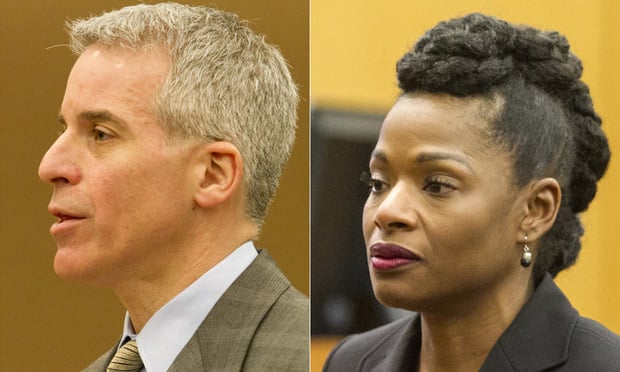Jury Weighs Sex Tape Case Against Lawyers, Former Client
“This is not a sexual harassment case,” said a prosecutor. “We're not asking you to determine whether Ms. Brindle was a victim of sexual harassment” or “to like Joe Rogers.”
April 10, 2018 at 04:54 PM
6 minute read
 Brian Steel (left) and Melissa Redmon
Brian Steel (left) and Melissa Redmon
Jurors on Tuesday afternoon deliberated starkly different versions of a criminal case against a woman and two lawyers accused of using a secret video camera to make an illegal recording of former Waffle House CEO Joe Rogers Jr. engaged in a sexual encounter with the woman.
In closing arguments, prosecutors said Rogers' former housekeeper Mye Brindle and her former lawyers, David Cohen and John Butters, had clearly violated Rogers' privacy in violation of the law when Brindle used the camera to record herself masturbating her boss in the bedroom of his home.
In 2012, Brindle threatened to sue Rogers for sexual harassment; during a mediation, she reportedly demanded $12 million to drop the matter.
Fulton County Assistant District Attorney Meighan Vargas said defense arguments that Brindle's role as Rogers' employee voided his expectation of privacy, since she was an “invitee” in his home, was absurd. That position, she added, would essentially mean no one could invite a friend in or even summon a plumber or babysitter without fear of being videotaped.
Nonsense, responded the defense, asserting that Georgia's “single-person consent” law allowing one to record interactions with an unknowing party allows such recording, even in a bathroom or bedroom, if one has essentially made it a public space.
By summoning Brindle to his room where he awaited her attentions, Rogers forfeited any expectation of privacy, said the defense lawyers.
Brindle's lawyer, Reid Thompson, told the panel that testimony in the trial that began last week clearly indicated that Rogers had a history of demanding sexual favors from employees.
Thompson pointed to testimony by another former housekeeper who said Rogers had demanded massages and groped her. That woman sued Waffle House in Texas in 1997, and the judge in that case entered a scathing order accusing Rogers of perjury and attempting to suborn perjury, but that ruling was subsequently vacated.
Thomson also reminded jurors of former Waffle House executive Ann Parker, who said that, after she testified in the civil cases in 2013, Rogers tried to get her to change her testimony—and when she didn't, he punished her by withholding due stock option payments.
Parker also testified that she had had an affair with Rogers.
Rogers and his “attack dog lawyer” made sure Parker paid the price, said Thompson, sullying her professionally and harming her financially.
Brindle knew the only way she could hold Rogers accountable was to get more evidence, and she sought legal counsel who advised her exactly how to do it legally, he said.
Once Brindle had the video, “She didn't call 'TMZ,' she didn't call the National Inquirer, she didn't shop it around” or “make calls from payphones demanding cash.”
Brindle and her lawyers attempted “to stop that abuse and to prevent it from happening to the next lady.”
All the defendants acted legally, he said.
The state asserted that Rogers was not on trial, said Thompson, adding “Well, yes he is. … It's all about Joe Rogers.”
Unlike Brindle, neither of her former lawyers, Butters and Cohen, testified at trial, but their lawyers continued to assert that they assiduously followed the law.
Butters' lawyer, Bruce Morris, noted that his 72-year-old client had spent nearly 50 years in practice, including several years working free of charge as an assistant Cobb County prosecutor.
When Brindle approached Butters and Cohen and told her what she had endured at Rogers' hands, “she was so scared she [refused to] even give them her name,” said Morris, out of fear for what Rogers would do “when she outed him for the monster he was.”
“It's a noble thing for a lawyer to take on a case for somebody who has been hurt against somebody powerful,” Morris said.
Rogers, he said, was out to “crush” the defendants who dared to take him on.
Cohen's lawyer, Brian Steel, launched perhaps the most forceful attack on Rogers.
“You don't summon a housekeeper into your room when you're naked … and have her insert a finger in your anus and wrap the other hand around your erect penis,” Steel said.
Comparing such conduct to summoning a plumber to fix a toilet is an “insult,” said Steel. “What about putting on some clothes? What about acting like a human being?”
Steel lambasted Rogers as a “filthy, despicable human being,” repeatedly accusing him of lying on the witness stand and using influential lawyers to push the Fulton DA to file criminal charges.
The case is “upside down,” said Steel. “That's the face of a victim,” he said gesturing toward Brindle. “That's the face of a criminal,” he continued, pointing toward Rogers seated in the gallery.
Then it was lead prosecutor Melissa Redmon's turn to close the trial.
“You've heard a lot about Joe Rogers,” said Redmon, but it was the defendants' own actions that landed them on trial.
“This is not a sexual harassment case,” said Redmon. “We're not asking you to determine whether Ms. Brindle was a victim of sexual harassment” or “to like Joe Rogers.”
“If I feel that you've wronged me, I can call the police or the district attorney or the solicitor,” she said. “What I can't do is break the law myself.”
Redmon scoffed at the idea that Rogers influenced her boss, District Attorney Paul Howard, to prosecute the case.
Rogers, she noted, has endured hours of grueling cross-examination and public humiliation for his efforts.
The key to the case was the defendants' desire for a big settlement, she said, but Rogers refused to be blackmailed.
“They knew better,” said Redmon. “They didn't care.”
Correction: The initial version of this article misstated the name of one of the defense lawyers. He is Bruce Morris, not Bruce Maloy.
This content has been archived. It is available through our partners, LexisNexis® and Bloomberg Law.
To view this content, please continue to their sites.
Not a Lexis Subscriber?
Subscribe Now
Not a Bloomberg Law Subscriber?
Subscribe Now
NOT FOR REPRINT
© 2025 ALM Global, LLC, All Rights Reserved. Request academic re-use from www.copyright.com. All other uses, submit a request to [email protected]. For more information visit Asset & Logo Licensing.
You Might Like
View All

On The Move: Ex-Partner Returns to Lead Nelson Mullins Corporate Group, Burr & Forman Hires University GC as COO
5 minute read
Law Firm Sued for Telemarketing Calls to Customers on Do Not Call Registry

Evidence Explained: Prevailing Attorney Outlines Successful Defense in Inmate Death Case
Trending Stories
- 1New York-Based Skadden Team Joins White & Case Group in Mexico City for Citigroup Demerger
- 2No Two Wildfires Alike: Lawyers Take Different Legal Strategies in California
- 3Poop-Themed Dog Toy OK as Parody, but Still Tarnished Jack Daniel’s Brand, Court Says
- 4Meet the New President of NY's Association of Trial Court Jurists
- 5Lawyers' Phones Are Ringing: What Should Employers Do If ICE Raids Their Business?
Who Got The Work
J. Brugh Lower of Gibbons has entered an appearance for industrial equipment supplier Devco Corporation in a pending trademark infringement lawsuit. The suit, accusing the defendant of selling knock-off Graco products, was filed Dec. 18 in New Jersey District Court by Rivkin Radler on behalf of Graco Inc. and Graco Minnesota. The case, assigned to U.S. District Judge Zahid N. Quraishi, is 3:24-cv-11294, Graco Inc. et al v. Devco Corporation.
Who Got The Work
Rebecca Maller-Stein and Kent A. Yalowitz of Arnold & Porter Kaye Scholer have entered their appearances for Hanaco Venture Capital and its executives, Lior Prosor and David Frankel, in a pending securities lawsuit. The action, filed on Dec. 24 in New York Southern District Court by Zell, Aron & Co. on behalf of Goldeneye Advisors, accuses the defendants of negligently and fraudulently managing the plaintiff's $1 million investment. The case, assigned to U.S. District Judge Vernon S. Broderick, is 1:24-cv-09918, Goldeneye Advisors, LLC v. Hanaco Venture Capital, Ltd. et al.
Who Got The Work
Attorneys from A&O Shearman has stepped in as defense counsel for Toronto-Dominion Bank and other defendants in a pending securities class action. The suit, filed Dec. 11 in New York Southern District Court by Bleichmar Fonti & Auld, accuses the defendants of concealing the bank's 'pervasive' deficiencies in regards to its compliance with the Bank Secrecy Act and the quality of its anti-money laundering controls. The case, assigned to U.S. District Judge Arun Subramanian, is 1:24-cv-09445, Gonzalez v. The Toronto-Dominion Bank et al.
Who Got The Work
Crown Castle International, a Pennsylvania company providing shared communications infrastructure, has turned to Luke D. Wolf of Gordon Rees Scully Mansukhani to fend off a pending breach-of-contract lawsuit. The court action, filed Nov. 25 in Michigan Eastern District Court by Hooper Hathaway PC on behalf of The Town Residences LLC, accuses Crown Castle of failing to transfer approximately $30,000 in utility payments from T-Mobile in breach of a roof-top lease and assignment agreement. The case, assigned to U.S. District Judge Susan K. Declercq, is 2:24-cv-13131, The Town Residences LLC v. T-Mobile US, Inc. et al.
Who Got The Work
Wilfred P. Coronato and Daniel M. Schwartz of McCarter & English have stepped in as defense counsel to Electrolux Home Products Inc. in a pending product liability lawsuit. The court action, filed Nov. 26 in New York Eastern District Court by Poulos Lopiccolo PC and Nagel Rice LLP on behalf of David Stern, alleges that the defendant's refrigerators’ drawers and shelving repeatedly break and fall apart within months after purchase. The case, assigned to U.S. District Judge Joan M. Azrack, is 2:24-cv-08204, Stern v. Electrolux Home Products, Inc.
Featured Firms
Law Offices of Gary Martin Hays & Associates, P.C.
(470) 294-1674
Law Offices of Mark E. Salomone
(857) 444-6468
Smith & Hassler
(713) 739-1250






